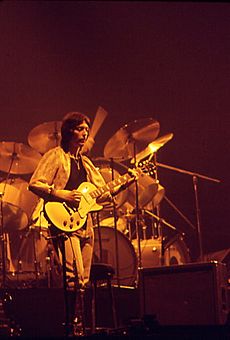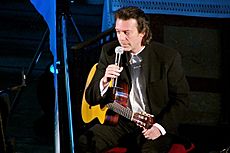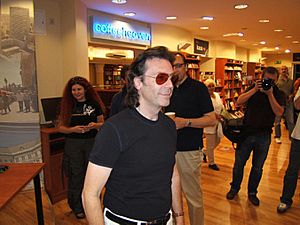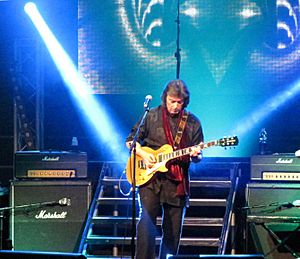Steve Hackett facts for kids
Quick facts for kids
Steve Hackett
|
|
|---|---|
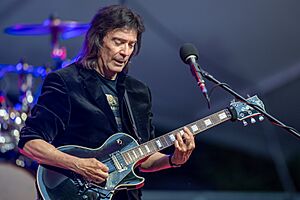
Hackett in 2024
|
|
| Background information | |
| Birth name | Stephen Richard Hackett |
| Born | 12 February 1950 London, England |
| Genres |
|
| Occupation(s) |
|
| Instruments | Guitar, vocals |
| Years active | 1968–present |
| Labels |
|
| Members | List |
Stephen Richard Hackett (born on February 12, 1950) is an English guitarist. He became famous as the lead guitarist for the progressive rock band Genesis from 1971 to 1977. Steve helped create six studio albums, three live albums, seven singles, and one EP (a short music collection) with Genesis before he left to start his own music career. In 2010, he joined the Rock and Roll Hall of Fame as a member of Genesis.
Steve released his first solo album, Voyage of the Acolyte, in 1975 while he was still with Genesis. After making more solo albums starting in 1978, Steve helped start the supergroup GTR with Steve Howe in 1986. Their album, GTR, reached number 11 on the Billboard 200 music chart in the United States and had a Top 20 hit song called "When the Heart Rules the Mind". When Steve left GTR in 1987, the group broke up. Steve then went back to his solo career. He has released many albums and toured around the world regularly since then.
Steve's music includes many different styles. Besides progressive rock, he has explored pop, blues, world music, and classical music on his solo recordings. According to Guitar World magazine, Steve was one of the first to use special guitar techniques like "two-handed tapping" and "sweep picking." These techniques were very new at the time and inspired famous guitarists like Eddie Van Halen and Brian May. Other guitarists influenced by Steve include Alex Lifeson and Steve Rothery.
Contents
Early Life and Musical Beginnings
Stephen Richard Hackett was born on February 12, 1950, in Pimlico, central London. His parents were Peter and June Hackett. He was born just one day before Peter Gabriel, who would later be his bandmate in Genesis. Steve has a younger brother named John, who plays the flute. John has often performed, worked with, and written music with Steve throughout his solo career. He also helped compose some early Genesis songs without getting credit, like "Get 'Em Out by Friday" and "Cuckoo Cocoon." Steve went to Sloane Grammar School in Chelsea. In the 1950s, his family moved to Vancouver, Canada, but they returned home after his parents, especially his mother, missed England too much.
Steve grew up with different musical instruments available, such as the harmonica and recorder. However, he didn't become interested in the guitar until he was 12 years old, when he started playing single notes. By age 14, he was learning chords and trying out different chord progressions, even though he never had formal music lessons.
Steve's earliest musical influences were classical music, like Johann Sebastian Bach, and opera, like Mario Lanza. He has said that his own songs are still influenced by them. Steve has also mentioned many British blues artists as influences, including Danny Kirwan, Peter Green, and various guitarists from John Mayall & The Bluesbreakers. He also admired Jimi Hendrix, the Beatles, and King Crimson.
Steve Hackett's Music Career
Early Bands (1968–1970)
Steve Hackett's first professional experience playing music was with three rock bands: Canterbury Glass, Heel Pier, and Sarabande. All these bands played rock music with elements of progressive rock. He then joined Quiet World in 1970, which included his brother John on flute. Steve didn't write any songs with Quiet World because the band's founders told the other members what to play. This was fine with Steve, as he wanted to gain more experience in a recording studio since the band had a record deal. Steve played on the band's only studio album, The Road (1970), and left them soon after.
Joining Genesis (1970–1977)
In December 1970, Steve Hackett placed an advertisement in Melody Maker magazine looking for a new band. It said: "Imaginative guitarist-writer seeks involvement with receptive musicians, determined to strive beyond existing stagnant music forms." Peter Gabriel, the lead singer of Genesis, responded to the ad. Genesis, which also included keyboardist Tony Banks, bassist/guitarist Mike Rutherford, and drummer Phil Collins, needed a new guitarist. Peter told Steve to listen to their album Trespass (1970) before his audition.
Steve's first live show with Genesis was on January 14, 1971, in London. His first recording with Genesis was Nursery Cryme (1971). His guitar playing is very noticeable on songs like "The Musical Box" and "The Return of the Giant Hogweed." Even though much of the music was already written when he joined, he helped a lot with the songwriting. He was one of the first to use the guitar tapping technique, which is often linked to Eddie Van Halen. Steve said that Van Halen learned this technique after seeing a Genesis concert in the mid-1970s.
The album Foxtrot (1972) includes Steve's guitar solo called "Horizons," which he based on a cello piece by Bach. On the first day of recording Foxtrot, Steve offered to leave Genesis because he felt he wasn't contributing enough. However, Mike Rutherford and Tony Banks told him they liked his playing and wanted him to stay. Steve said this was a very important moment that helped him feel more secure in the band.
Selling England by the Pound (1973) shows Steve using tapping and sweep picking, techniques that became popular later with guitarists like Yngwie Malmsteen. Both techniques are used on "Dancing with the Moonlit Knight". The song "Firth of Fifth" has one of Steve's most famous guitar solos. This solo remained a favorite in concerts even after Steve left the band. Peter Gabriel said that Selling England by the Pound "was [Hackett's] coming-of-age album in a lot of ways."
The time spent writing The Lamb Lies Down on Broadway (1974) was difficult for the whole group. Steve explained that "Everybody had their own agenda." Steve was not as involved in the songwriting for this album, though he did write parts for "Cuckoo Cocoon" and "Hairless Heart," and co-wrote "It" with Tony Banks. Steve liked "The Lamia" and "Fly on a Windshield" as his favorite parts of the album.
Steve was the only member of Genesis during his time who did not sing. He explained, "I was too shy to sing in those days; I thought I would sing out of tune."
After recording his first solo album, Voyage of the Acolyte, Steve returned to Genesis. They recorded A Trick of the Tail (1976), which was the band's first album after Peter Gabriel left. Steve is credited for co-writing three songs on this album: "Dance on a Volcano," "Entangled," and "Los Endos." The next album, Wind & Wuthering (1976), was Steve's last studio album with Genesis. He felt increasingly limited by not having enough freedom and input. He wanted more of his songs included on the album, but his ideas were turned down. One of his rejected songs, "Please Don't Touch," was used for his second solo album, Please Don't Touch!.
Steve left Genesis while they were mixing their live album, Seconds Out. His departure was announced on October 8, 1977. Steve said he "needed autonomy," meaning he wanted to be in charge of his own music.
Genesis Reunions
Since Steve left, the 1970–1975 lineup of Genesis has gotten back together a few times. On October 2, 1982, the group performed a special concert called Six of the Best to raise money for Peter Gabriel's WOMAD festival. In 1998, members of Genesis met for a photo shoot and dinner to celebrate the release of the Genesis Archive 1967–75 box set. Steve also helped re-record "The Carpet Crawlers" for a greatest hits album in 1999.
In late 2005, the 1970–1975 lineup discussed getting back together to perform The Lamb Lies Down on Broadway. After Peter Gabriel decided against it, Steve also chose not to join the project. This led to Tony Banks, Mike Rutherford, and Phil Collins forming the Turn It On Again: The Tour in 2006. In March 2010, the 1970–1975 Genesis lineup was inducted into the Rock and Roll Hall of Fame. Steve attended the ceremony with Tony Banks, Mike Rutherford, and Phil Collins.
In 2014, Steve was featured in the BBC documentary Genesis: Together and Apart, which focused on the band and the solo careers of its members. Steve later said he was unhappy with the documentary, calling it a "biased account of Genesis history" that "totally ignores" his solo work. Steve was included in the compilation album R-Kive, which featured Genesis songs and tracks from each member's solo career. His songs on it were "Ace of Wands," "Every Day," and "Nomads."
In 2022, Steve said he was invited to the final Genesis concert in London on March 26. However, he couldn't go because his own tour had to be rescheduled due to the COVID-19 pandemic.
Steve Hackett's Solo Career (1975–Present)
1970s Solo Work
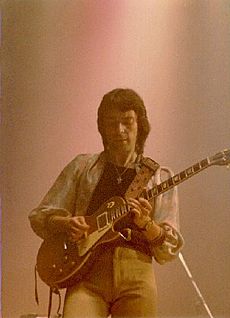
In October 1975, Steve released his first solo album, Voyage of the Acolyte. The album featured Phil Collins on drums and Mike Rutherford on bass. It reached number 26 in the UK and was certified silver. Steve enjoyed the freedom he had when writing and recording his own album. However, Mike Rutherford and Tony Banks told him he couldn't continue his solo career while in Genesis.
Steve's first album after leaving Genesis was Please Don't Touch!, released in 1978. Like Voyage of the Acolyte, much of the music on this album was in the style of progressive rock. It had much more singing, though. Steve, who had never sung lead or backing vocals on a Genesis song, had several singers perform most of the vocals. These included folk singer Richie Havens, R&B singer Randy Crawford, and Steve Walsh from the American progressive rock group Kansas. The album reached number 38 on the UK chart.
After releasing two albums, Steve needed to put together a band to play the music live. This band included his brother John Hackett on flute, Dik Cadbury on bass, Nick Magnus on keyboards, John Shearer on drums, and Pete Hicks on lead vocals. The tour that followed was Steve's first as a solo performer. It started in Oslo, Norway, on October 4, 1978, and ended with six shows across the UK. Steve used his band on his next album, Spectral Mornings, recorded in early 1979 in the Netherlands. The album features various musical styles, including rock, progressive rock, and folk. It reached number 22 in the UK. The tour for this album included a performance at the Reading Festival in August 1979.
1980s Solo Work
Before recording his fourth album, Defector, Steve played some concerts in November 1979 to try out new songs. Steve found recording Defector to be as good as Spectral Mornings. He noted the similar music between the two albums, though he thought the songs on Defector were some of the strongest of his career. When it was released, Defector reached number 9 on the UK chart, which is still his highest-charting album in the country. The album's tour included Steve's first solo concerts in the US.
Steve changed his musical direction with his fifth album, Cured (1981). He recorded it without his usual band, except for contributions from Nick Magnus and John Hackett. Steve sang all the lead vocals himself on this album. Instead of a live drummer, Nick Magnus used an electronic drum machine. While it still had progressive rock and classical songs, it also showed a more pop-oriented style. Released in August 1981, Cured reached number 15 in the UK. The tour for Cured featured a new lineup, with John Hackett and Nick Magnus joined by Chas Cronk on bass and Ian Mosley on drums.
After promoting Cured, Steve received an invitation to form a new trio with Keith Emerson and Jack Bruce. He turned down this offer and went ahead with his next studio album, Highly Strung, released in April 1983. This was his last album on the Charisma record label, as disagreements over Steve's musical direction ended their partnership. Highly Strung reached number 16 in the UK.
In 1983, Steve signed a deal with Lamborghini Records, which supported the release of his seventh album, Bay of Kings. This album featured classical guitar compositions. The album reached number 70 in the UK. This was followed in August 1984 by Steve's return to rock music with his next album, Till We Have Faces. This album combined his guitar playing with influences from Brazilian percussion and world music. The album reached number 54 in the UK.
In 1985, Steve formed the supergroup GTR with Yes and Asia guitarist Steve Howe. The group released a gold-selling album, which included "When the Heart Rules the Mind." This song became a hit, reaching number 14 on the Billboard Hot 100, which was the highest-charting US single in Steve's career. Steve soon left GTR due to money and management problems.
After GTR, Steve returned to the studio and recorded a new solo album, Momentum. He felt that making this album was like therapy after the problems he faced with GTR. Released in March 1988, his tour across Europe to promote the album was met with large and excited crowds.
In late 1989, Steve led the charity single "Sailing," a cover of Rod Stewart's 1975 hit. It was released under the name Rock Against Repatriation to raise money and awareness for Asian groups who faced difficult conditions in their home countries but were refused entry into Western countries. The song, released as a single in 1990, included Brian May, The Moody Blues, Mike Rutherford, Phil Manzanera, and Godley & Creme.
1990s Solo Work
In 1992, Steve started touring again for the first time in six years. This also marked his return to performing in the US after several years. He was happy that his 1992 North American tour was well-attended. He used the tour to test out new songs he had been working on and to promote his first live album, Time Lapse. A few months later, Steve also released a collection album called The Unauthorised Biography, which included two brand new studio songs. One of these, "Don't Fall Away from Me," was co-written by Steve and Brian May of Queen. In 1992, Steve also performed acoustic music with the London Chamber Orchestra, playing pieces by Vivaldi. He considers this show a highlight of his career.
In May 1993, Steve released his tenth studio album, Guitar Noir. It includes the song "Walking Away from Rainbows," which is about Steve's decision to leave mainstream music and pursue what he truly wanted. Steve followed this with a blues album, Blues with a Feeling (1994).
For his next album, Steve decided to rework some Genesis songs with various guest musicians. This album was released in 1996 as Genesis Revisited, which reached number 95 in the UK. It includes "Déjà Vu," a song Steve wrote with Peter Gabriel in 1973 that had never been finished. Steve promoted the album with two shows in Tokyo in December 1996. These concerts were recorded and filmed, later released as The Tokyo Tapes in 1998.
In April 1997, he released the classical-influenced album A Midsummer Night's Dream with music from the Royal Philharmonic Orchestra. It reached the top 10 on the UK classical chart. This marked the beginning of keyboardist, arranger, and producer Roger King taking a more important role in Steve's future albums and live shows. In 1999, Steve released his fourteenth studio album, Darktown. The album is named after a book, and the music and ideas took eight years to complete. It reached number 156 in the UK.
2000s Solo Work
In 2000, Steve and his brother John released Sketches of Satie, an album honoring the French composer Erik Satie. The songs were rearranged for flute and guitar. Steve said he had missed playing with John, and his manager suggested an album of Satie's music. Later in 2000, an album of Steve's music that was originally put together in 1986 but not released was finally put out as Feedback 86. Some of the music was meant for a second GTR album and features Brian May.
In 2001, Steve contributed instrumental music to the film score of Outwitting Hitler, a documentary about a Holocaust survivor. This was his first time working on a film soundtrack. He used themes he had released before, with some originally planned for his future guitar/orchestra album Metamorpheus (2005).
In 2003, Steve released To Watch the Storms, his first studio album in four years and the first completed in his new recording studio, Crown Studios. It also marked his return to progressive rock music. His next solo release was the orchestral album Metamorpheus (2005) with the Underworld Orchestra. This was followed by the rock album Wild Orchids (2006), and then Tribute (2007), a classical album featuring original pieces and versions of works by Bach, Byrd, Barrios, and Andrés Segovia.
The recording of Out of the Tunnel's Mouth (2009) faced various legal problems. A court decision allowed Steve to "be back in the record business" and to release Out of the Tunnel's Mouth on his new label, Wolfwork Records, in October 2009. The album was recorded at Steve's own apartment instead of a professional studio. It features contributions from former Genesis guitarist Anthony Phillips and Yes bassist Chris Squire. Steve toured to support the album.
In August 2009, an official biography, Sketches of Hackett by Alan Hewitt, was released.
2010s Solo Work
On March 15, 2010, Genesis was inducted into the Rock and Roll Hall of Fame. Steve made a rare appearance alongside Phil Collins, Tony Banks, and Mike Rutherford at the ceremony. Steve had publicly stated he was willing to participate in a Genesis reunion. A planned reunion of the classic 1970s Genesis lineup did not happen in 2007 when Peter Gabriel had doubts, and Steve then decided not to join, allowing the Genesis 'trio' lineup to proceed.
In 2011, Steve released his 24th studio album, Beyond the Shrouded Horizon, which reached number 133 on the UK album chart. In 2012, he toured the UK to promote the album. Also in 2012, Steve and Chris Squire worked together again to release the album A Life Within a Day under the name Squackett.
Steve released Genesis Revisited II in October 2012. His main reason for revisiting the project was to perform the music live again. He invited various musicians to perform the songs, which included both Genesis material and some of his solo songs. Ray Wilson, a former Genesis lead vocalist, was involved. The album was very popular, leading to Steve having a stronger presence on the music charts and a sold-out tour in the UK. The album reached number 24 in the UK. In June 2013, both Genesis Revisited albums received a Japanese Gold Sales Award for selling 100,000 copies. The UK tour included a show in London that won Steve the Event of the Year Award at the 2013 Progressive Music Awards. The show was released on CD and DVD as Genesis Revisited: Live at Hammersmith, which reached number 58 in the UK. Steve completed a second tour with a different setlist in 2014, which resulted in Genesis Revisited: Live at the Royal Albert Hall. This reached number 80 in the UK. After the success of the Genesis Revisited tours, Steve has seen himself as "the keeper of the flame of the early work" of Genesis.
In March 2015, Steve released Wolflight. It reached number 31 in the UK. Wolflight also contains Chris Squire's last studio recording on the song "Love Song to a Vampire." In September 2015, the independent music company Wienerworld released The Man, The Music, a documentary about Steve's career that reached number 5 on the UK DVD chart. That October, Universal/Virgin released Premonitions: The Charisma Years 1975–1983, a 14-disc box set of his first six studio albums with extra material, including live recordings and new remixes by Steven Wilson.
Steve's solo album The Night Siren (number 28 on the UK album chart) was released in March 2017 and entered the top 40 in six international album charts. The album continues to explore world music and progressive rock. In October, Steve won the "Chris Squire Virtuoso" award at the 2017 Progressive Music Awards.
In October 2018, Steve went on a UK tour where his band performed Genesis and solo songs with the 41-piece Heart of England Symphony Orchestra. A live album and concert film from the tour, titled Genesis Revisited Band & Orchestra: Live at the Royal Festival Hall, was released in 2019.
Steve released At the Edge of Light in January 2019. The album reached number 28 in the UK. In 2019, Steve toured with a set that included Selling England by the Pound performed in its entirety, along with other Genesis songs and tracks from At the Edge of Light and Spectral Mornings. This tour celebrated the fortieth anniversary of Spectral Mornings. The show at London's Hammersmith Apollo, the last of the tour, was released as a live album and concert film on September 25, 2020, titled Selling England by the Pound & Spectral Mornings: Live at Hammersmith.
2020s Solo Work
In March 2020, Steve cancelled his North American tour due to the COVID-19 pandemic. He resumed touring with performances, including Genesis' Seconds Out in September 2021.
In July 2020, Steve released his autobiography, A Genesis in My Bed. In an interview promoting the book, he shared that he was working with Roger King on an acoustic album with an orchestra called Under a Mediterranean Sky. He was also working on a rock album with world music influences called Surrender of Silence. These albums were released on January 22, 2021, and September 10, 2021, respectively. Surrender of Silence entered the UK chart at number 31 and made the top 10 chart in Germany.
Another solo album, The Circus and the Nightwhale, was released on February 16, 2024, on InsideOut Music.
On April 16, 2024, Steve was hospitalized due to a bad reaction to medication for a bronchial infection, and a show in Phoenix was cancelled.
Steve Hackett's Personal Life
Steve Hackett has been married three times. His first marriage was to Ellen Busse in 1972, and they had one son, Oliver (born 1974). This marriage ended in 1974. In 1981, Steve married Brazilian painter and jewelry artist Kim Poor, who designed many of his album covers. They divorced in 2007.
In June 2011, Steve married author Jo Lehmann, who has written lyrics for several of Steve's songs. Jo's sister, Amanda, is a singer, songwriter, and musician who has performed on several of Steve's songs and tours since 2009.
Current Live Band Members
- Steve Hackett – guitar, harmonica, vocals (1978–present)
- Roger King – keyboards (2001–present)
- Rob Townsend – saxophone, flute, keyboards, percussion, bass pedals, vocals (2001–2004, 2009–present)
- Nad Sylvan – vocals, tambourine (2013–present)
- Jonas Reingold – bass, 12-string guitar, bass pedals, vocals (2018–present)
- Craig Blundell – drums, percussion, vocals (2018–present)
Steve Hackett's Albums
Studio albums
- Voyage of the Acolyte (1975)
- Please Don't Touch! (1978)
- Spectral Mornings (1979)
- Defector (1980)
- Cured (1981)
- Highly Strung (1983)
- Bay of Kings (1983)
- Till We Have Faces (1984)
- Momentum (1988)
- Guitar Noir (1993)
- Blues with a Feeling (1994)
- Genesis Revisited (1996)
- A Midsummer Night's Dream (1997)
- Darktown (1999)
- Feedback 86 (2000)
- To Watch the Storms (2003)
- Metamorpheus (2005)
- Wild Orchids (2006)
- Tribute (2008)
- Out of the Tunnel's Mouth (2009)
- Beyond the Shrouded Horizon (2011)
- Genesis Revisited II (2012)
- Wolflight (2015)
- The Night Siren (2017)
- At the Edge of Light (2019)
- Under a Mediterranean Sky (2021)
- Surrender of Silence (2021)
- The Circus and the Nightwhale (2024)
See also
 In Spanish: Steve Hackett para niños
In Spanish: Steve Hackett para niños
 | Emma Amos |
 | Edward Mitchell Bannister |
 | Larry D. Alexander |
 | Ernie Barnes |


